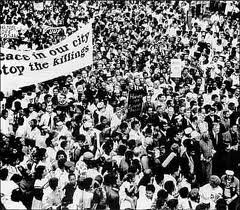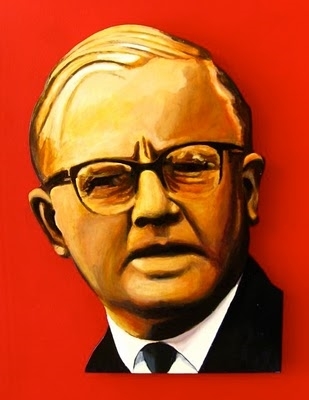 |
Intro to Apartheid
Apartheid was a system of government established in South Africa by the minority Afrikaner government in the early twentieth century. The word itself means, "apartness" or "separateness". The system of government was adapted as law after Afrikaner nationalists were elected to office in 1948. Apartheid essentially legalized racial segregation in South Africa. This gave the minority whites, who were in control of the South African government, the power to restrict blacks any way they saw fit. One of the first discriminatory laws was the Population Registration Act. This put all South Africans into racial categories, Bantu (blacks), white or mixed of the two races. Soon blacks couldn't vote or run for office. Eventually they were restricted to the outskirts of white controlled cities such as the Alexandra township outside, the towering metropolis, Johannesburg. As time went on more and more discriminatory laws were put into practice. Laws that made it difficult for black South Africans to live a normal life. One law required that all nonwhite South Africans have a passbook, which was to be kept as identification and documentation of certain permits. These permits being housing documents or proof of employment. If someones permit showed that they were unemployed, they were immediately arrested. This made it even harder to look for jobs because doing so would mean taking the risk of being stopped by the police and then arrested. Apartheid, a racist, unfair and inhuman system of government, was finally repealed in 1994 following the election of Nelson Mandela, South Africa's first black president.
Persecution
On April 3, 1950, the South African Communist Party (or SACP) was declared illegal. All known members were arrested, and the group was forced to move underground. A member of the party named Bram Fisher, who had previously been a prominent anti-apartheid activist and lawyer, went silent. Bram would successfully hide his true identity from the police for 14 years. During which he played an integral role on the defense team of the Treason Trial of 56-61, lead the legal defense team at the Rivonia Trial, and generally enforce his anti-Apartheid beliefs wherever and whenever he could. His activity in the anti-Apartheid movement however, caused him to clash with the South African government on more than one occasion.
In the fall of 1964, the law finally caught up with him. Fisher was arrested, and charged with the illegal membership of the SACP. The court offered to forgo the $6530 bail required if he would accept exile, but Bram refused. On the date of his trial, Bram did not show up, and when police broke into the house he had been staying in, Bram was not there. Fisher had decide to go underground to support the liberation struggle against Apartheid, and stayed there for almost a year. In the November of 1965, he was arrested again. This time charged with furthering the aims of communism and a conspiracy to overthrow the government. Fisher was found guilty and sentenced to life in prison. It was in prison that he contracted cancer, and later, died under house arrest.
Fight Against Apartheid
Bram Fischer did not "fight" the apartheid in the sense that he caused physical harm to people to get justice. Bram Fischer fought the Apartheid without violence. Fischer was a lawyer. Although he was a Afrikaner and grew up in an Afrikaner family, he fought for the colored people rights. He saw what was happening and that it was wrong.
Bram Fischer fought with politics. He was a lawyer and was also in communist groups. Bram Fischer was in the SACP (SA communist party) and the ANC. Bram Fischer not only was in these organizations but he also defended the leaders of these and others like them. Bram Fischer defended Nelson Mandela, Walter Sisulu, and eighteen other leaders when they got in trouble for participating in the Defiance Campaign. This was one of the ways he fought against the Apartheid. He was very devoted to his beliefs and was willing to do what it took to make things right. If this meant that he would go to prison then that was okay with him.
In 1964 Bram Fischer was arrested for being involved in what were considered illegal communist groups. In 1966 he was sentenced to life in prison. In 1967 he was given the Lenin Peace Prize. In 1967 it got out that Bram Fischer was very sick with cancer and did not have long to live. He was released from prison to his brothers house, where his brother was his caretaker. Bram Fischer Died May 8, 1975 of cancer.
 |
Biography
Bram Fisher was born April 23, 1908 to a Afrikaans family in Orange Free State. Later in Brams life his father would become a much respected judge, but at the time his dad was part of the Bloemfontein bar. Even though Bram Fischer was raised fully as a full English speaking kid he declared that he himself was a proud Afrikaner. After his kid years, Bram went to Grey College in Bloemfontein, after that he went to Grey University College were he exceeded at Rugby and Tennis. He began to study Law at Grey university which was part of the university of Africa, after he completed his studies in south Africa, he went on to study for three more years at Oxford University as a Rhodes scholar. Years before he had met a lady by the name of Molly Kridge, the two made a great pair because Molly had the intellect and Bram had the leadership qualities. Both of them started supporting the communist party. One year while Bram was on vacation he visited the Soviet Union where he became a convert to the Stalinist doctrine. He now believed that Fascism and Nazism to be a "cancerous nationalism". Bram's results for his bachelor degree in arts honours was disappointing to him. Upon his return to South Africa, Bram was asked if he could join the Bloemfontein bar. At first things were slow, but as work picked up for Bram he devoted all his time to his work. Gradually his practises expanded, it expanded mostly in the specialized area that dealt with the mines and people who lived/worked in them. Because of Bram's success, people started believing that Bram was starting a Career that would eventually culminate into great things. In 1937, Bram and Molly were married and they both became part of the communist party of South Africa. From then on they were both devoted to the Communist party. In 1943, he helped revise the ANC. Bram was named king's council in 1951. In 1952 he defended Nelson Mandela and other members of the ANC in the treason trial from 1956-1961. He was on the Johannesburg bar council, and then in 1961, he was elected chairman. In 1960 an act was passed that someone could be charged without trial, things got harder for Bram, and in 1964, Bram was tried for contravening the suppression of communism act. A week later Bram was granted bail to go defend someone in England, and upon Bram's return the trial continued, but in 1965, Bram escaped, and went underground by disguising himself as Douglas Black. Nine months later he was caught and brought back in for trial, this time he had a higher charge put against him called Sabotage. In 1966, he was charged with violating, the suppression of communism act and conspiring to commit sabotage, he was sentenced to life in prison and in 1974 after 8 years in prison, it became known that Bram had cancer. People started to ask for his release and after awhile they prevailed and got Bram Fischer released to his brother where he died a few weeks later.
MLA: "Apartheid." Africana: The Encyclopedia of the African and African American Experience. N.p., n.d. Web. 15 Feb. 2012.
Page created on 6/25/2012 12:00:00 AM
Last edited 6/25/2012 12:00:00 AM
